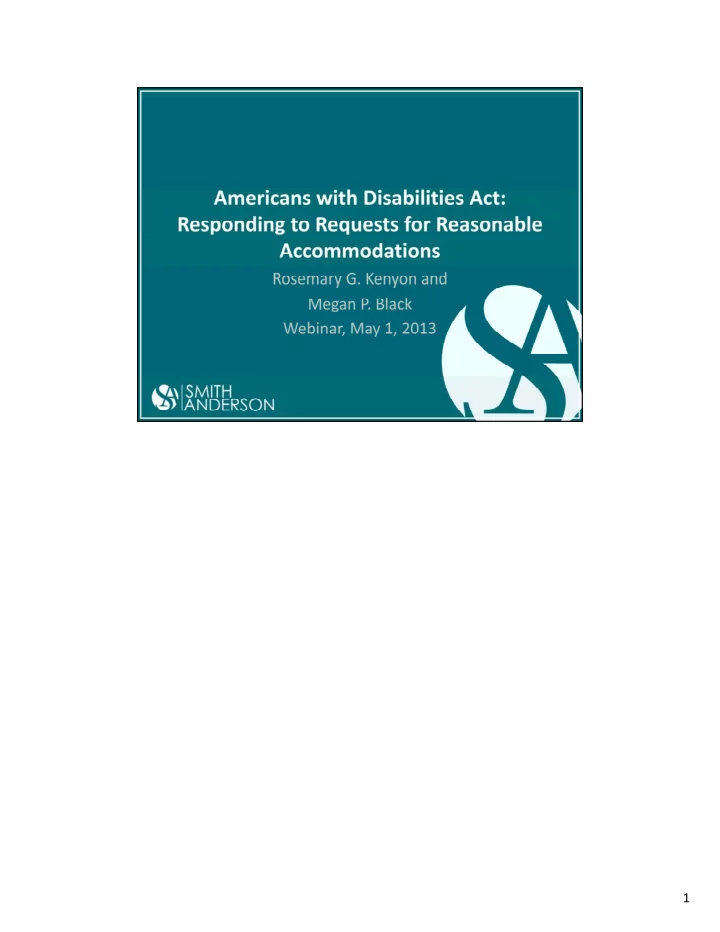

1
2
Key Employer Obligations under the ADA Do not discriminate • Provide reasonable accommodations when required • Limit medical inquiries • Keep information confidential • ADA Amendments Act of 2008, effective January 2009 . Greatly expanded scope of covered disabilities It lowers the threshold for what is a disability specifies new classes of covered disabilities. It lowers the threshold for what is a disability, specifies new classes of life activities that must be considered, covers conditions that are episodic, in remission, or mitigated by treatment and expanded the definition of who may be “regarded as” disabled. The result is that employers must shift their focus to the rest of the analysis and, in particular, the interactive process to determine whether a reasonable accommodation is available. Genetic Information Nondiscrimination Act (“GINA”) was enacted in 2008, and effective in 2009. EEOC Final rules issued in 2010. 3
4
5
6
7
Definition of Essential Functions (EEOC regulation (excerpts)) (n) Essential functions – (1) In general . The term essential functions means the fundamental job duties of the employment position the individual with a disability holds or desires. The term “essential functions” does not include the marginal functions of the position. (2) A job function may be considered essential for any of several reasons, including but not limited to the following: not limited to the following: (i) Because the reason the position exists is to perform that function; (ii) Because of the limited number of employees available among whom the performance of that job function can be distributed; and/or (iii) The function may be highly specialized so that the incumbent in the position is hired for his or her expertise or ability to perform the particular function. (3) Evidence of whether a particular function is essential includes, but is not limited to: (i) The employer’s judgment as to which functions are essential; (ii) Written job descriptions prepared before advertising or interviewing applicants for the job; (iii) The amount of time spent on the job performing the function; (iv) The consequences of not requiring the incumbent to perform the function; (v) The terms of a collective bargaining agreement; (vi) The work experience of past incumbents in the job; and/or (vii) The current work experience of incumbents in similar jobs (vii) The current work experience of incumbents in similar jobs. (29 C.F.R. § 1630.2(n) (2012) 8
9
10
11
12
13
Definition of Qualified Individual (EEOC regulation) To be a qualified individual under the ADA, one must: • Have the skills, experience, education and other job ‐ related requirements necessary for the position. • Be able to perform the essential functions of the job with or without a reasonable accommodation. (29 C.F.R. § 1630.2(m) (2012) 14
EEOC guidance on Reasonable Accommodations (excerpts): Title I of the ADA “requires an employer to provide reasonable accommodation to qualified Titl I f th ADA “ i l t id bl d ti t lifi d individuals with disabilities who are employees or applicants for employment, unless to do so would cause undue hardship. . . . There are three categories of "reasonable accommodations”: "(i) modifications or adjustments to a job application process that enable a qualified applicant with a disability to be considered for the position such qualified applicant desires; or (ii) modifications or adjustments to the work environment, or to the manner or circumstances under which the position held or desired is customarily performed, that enable a qualified individual with a disability to perform the essential functions of that position; or (iii) modifications or adjustments that enable a covered entity's employee with a disability to enjoy equal benefits and privileges of employment as d tit ' l ith di bilit t j l b fit d i il f l t are enjoyed by its other similarly situated employees without disabilities.” EEOC guidance on Undue Hardship (excerpts): “The only statutory limitation on an employer's obligation to provide "reasonable accommodation" is that no such change or modification is required if it would cause "undue hardship" to the employer. "Undue hardship" means significant difficulty or expense and focuses on the resources and circumstances of the particular employer in relationship to the cost or difficulty of providing a specific accommodation. Undue hardship refers not only to financial difficulty, but to reasonable ifi d i U d h d hi f l fi i l diffi l b bl accommodations that are unduly extensive, substantial, or disruptive, or those that would fundamentally alter the nature or operation of the business. An employer must assess on a case ‐ by ‐ case basis whether a particular reasonable accommodation would cause undue hardship. The ADA's "undue hardship" standard is different from that applied by courts under Title VII of the Civil Rights Act of 1964 for religious accommodation.” See: EEOC Enforcement Guidance: Reasonable Accommodation and Undue Hardship under the ADA : www.eeoc.gov/policy/docs/accommodation.html / l /d / d h l 15
16
17
18
19
20
21
Recommend
More recommend